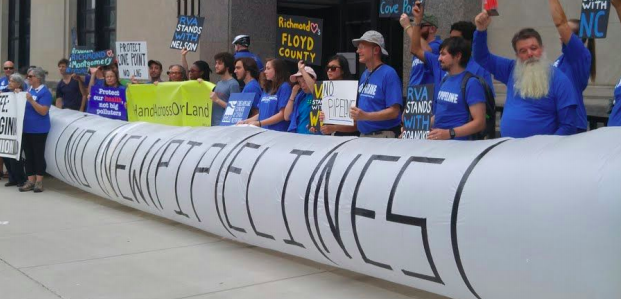Virginia is facing an unprecedented expansion of fracked-gas infrastructure.
Just this morning, Mountain Valley applied for federal approval to build a $3.2 billion, 301-mile fracked-gas pipeline from northwestern West Virginia to southern Virginia. The Mountain Valley Pipeline is just one of four interstate gas pipeline projects currently proposed for the central Blue Ridge and Appalachian Mountain region of Virginia and West Virginia—along with Dominion’s 564-mile Atlantic Coast Pipeline, Williams’ Appalachian Connector Pipeline, and the Columbia Pipeline Group’s WB Xpress Project.
Dominion this summer applied to build a $1.3-billion natural gas-fueled power plant in the southern Virginia county of Greensville. Dominion’s press release announcing its proposed 1600-megawatt gas plant also touted its 400 megawatts of planned solar generation—a mere quarter of the power that would be produced by its natural gas plant. This release serves to illustrate Dominion’s very clear preference for fossil fuels over renewables.
This rush to natural gas brings considerable consumer, health and climate risks. A growing number of studies show that natural gas is just as bad as coal for the climate. Greenhouse gas pollution is emitted as every step of the natural gas lifecycle, from fracking to piping to eventual burning of the gas. In addition to the climate concerns, each step presents a unique threat to human health, natural resources, and communities.
Virginia’s doubling down on natural gas also puts electricity consumers at risk, according to a new report from the Union of Concerned Scientists. Instead of moving toward cleaner, renewable energy, Virginia is ramping up its investment in natural gas. From 2008 to 2014, Virginia’s in-state electricity generation fueled by natural gas increased by 14.3 percent. Ninety-eight percent of new plants contemplated for the commonwealth will be powered by natural gas. In fact, Virginia is projected to install 12,500 megawatts of new natural gas capacity by 2017.
UCS warns that natural gas prices are volatile, leaving consumers open to price spikes. As the country moves to limit carbon emissions, overreliance on fossil fuels will cause utilities to saddle their customers with higher electricity rates to account for the cost of carbon. Plus, gas plants and pipelines are enormously expensive. As the country moves away from fossil fuels, customers could be on the hook for billions of dollars’ worth of underused, idled, or even abandoned plants and pipelines.
CCAN’s legal team is pushing back against Virginia’s rush to natural gas at every step. Today, CCAN filed a motion to intervene in the permit process for the Atlantic Coast Pipeline. By intervening, we will become a formal party to the proceeding and reserve the right to challenge the approval in federal court. On behalf of CCAN and 15 other Virginia and West Virginia groups, our attorneys at Appalachian Mountain Advocates also filed with FERC a detailed protest opposing the pipeline and asking for an evidentiary hearing. We also plan to intervene in the Mountain Valley Pipeline proceeding as that process moves forward. Represented by the Southern Environmental Law Center, we’re also formal participants in the State Corporation Commission’s review of Dominion’s proposed Greensville gas plant. Throughout these legal fights, we will argue that renewable energy – not more fossil fuels – is the right choice for Virginia.





